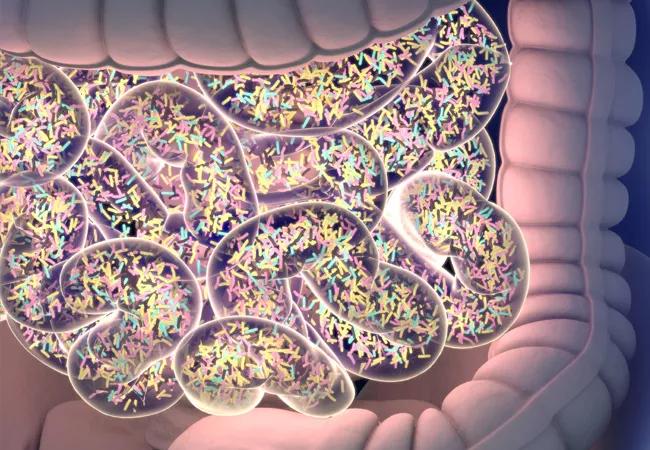Findings from the prospective analysis and implications for diagnosing, preventing lethal prostate cancer

A multidisciplinary team of Cleveland Clinic researchers has shown for the first time that diet-associated molecules in the gut are associated with lethal prostate cancer. Findings from the study were published in Cancer Epidemiology, Biomarkers & Prevention.
Advertisement
Cleveland Clinic is a non-profit academic medical center. Advertising on our site helps support our mission. We do not endorse non-Cleveland Clinic products or services. Policy
While more research will be necessary, the study’s lead author Nima Sharifi, MD, says findings from the team’s analysis of nearly 700 patients may have clinical implications for diagnosing and preventing lethal prostate cancer.
“We found that men with higher levels of certain diet-related molecules are more likely to develop aggressive prostate cancer,” said Dr. Sharifi, Director of the Cleveland Clinic Genitourinary Malignancies Research Center and staff in Lerner Research Institute’s Department of Cancer Biology. “As we continue our research in this area, our hope is that one day these molecules can be used as early biomarkers of prostate cancer and help identify patients who can modify their disease risk by making dietary and lifestyle changes.”
In this study, Dr. Sharifi and his collaborators—including Stanley Hazen, MD, PhD, and Eric Klein, MD,—analyzed data from patients previously enrolled in the National Cancer Institute’s Prostate, Lung, Colorectal and Ovarian (PLCO) Cancer Screening Trial.
They studied baseline levels of certain dietary nutrients and metabolites (byproducts produced when a substance is metabolized, or broken down, in the gut) found in patients’ blood serum prior to prostate cancer diagnosis. They compared serum levels between healthy patients and those who went on to receive a prostate cancer diagnosis and died from aggressive prostate cancer.
The researchers found that men with elevated levels of a metabolite called phenylacetylglutamine (PAGln) were approximately two or three times more likely to be diagnosed with lethal prostate cancer. Phenylacetylglutamine is produced when microbes in the gut break down an amino acid called phenylalanine, which is found in many plant- and animal-based protein sources like meat, beans and soy.
Advertisement
In addition to PAGln, the researchers also discovered that elevated levels of two nutrients abundant in animal products including red meat, egg yolks and high-fat dairy products, called choline and betaine, were also linked with increased risk for aggressive prostate cancer.
While these nutrients and gut metabolites have been well studied in the context of heart disease and stroke, this is the first time that any gut microbiome metabolites have been studied clinically in relation to prostate cancer outcomes.
Dr. Hazen was the first to identify PAGln’s association with increased cardiovascular disease risk. The findings were published in 2020 in Cell. “Interestingly, we found that PAGln binds to the same receptors as beta blockers, which are drugs commonly prescribed to help lower blood pressure and subsequent risk of cardiac events. This suggests that part of beta blockers’ potent efficacy may be due to blocking the metabolite’s activity,” said Dr. Hazen, director of the Cleveland Clinic Center for Microbiome & Human Health and chair of Lerner Research Institute’s Department of Cardiovascular & Metabolic Sciences.
“New insights are emerging from large-scale clinical datasets that show use of beta blockers is also associated with lower mortality due to prostate cancer,” said Dr. Sharifi. “We will continue to work together to investigate the possible mechanisms linking PAGln activity and prostate cancer disease processes in hopes of identifying new therapeutic targets for our patients.”
Advertisement
The research team will continue to explore the reliability of using choline, betaine and PAGln as biomarkers of aggressive prostate cancer and how dietary interventions can be used to modulate their levels and reduce patients’ subsequent disease risk.
Chad Reichard, MD, a previous urology resident at Cleveland Clinic and current urologic oncologist at Urology of Indiana, and Bryan Naelitz, a medical student in Dr. Sharifi’s lab, are co-first authors on the study. Dr. Klein is an urologist and Emeritus chair of Cleveland Clinic’s Glickman Urological & Kidney Insitute. The research was supported by the National Cancer Institute and the National Heart, Lung, and Blood Institute (both parts of the National Institutes of Health), as well as the Prostate Cancer Foundation.
Advertisement
Advertisement

First-of-its-kind research investigates the viability of standard screening to reduce the burden of late-stage cancer diagnoses

Global R&D efforts expanding first-line and relapse therapy options for patients

Study demonstrates ability to reduce patients’ reliance on phlebotomies to stabilize hematocrit levels

A case study on the value of access to novel therapies through clinical trials

Findings highlight an association between obesity and an increased incidence of moderate-severe disease

Cleveland Clinic Cancer Institute takes multi-faceted approach to increasing clinical trial access 23456

Key learnings from DESTINY trials

Overall survival in patients treated since 2008 is nearly 20% higher than in earlier patients